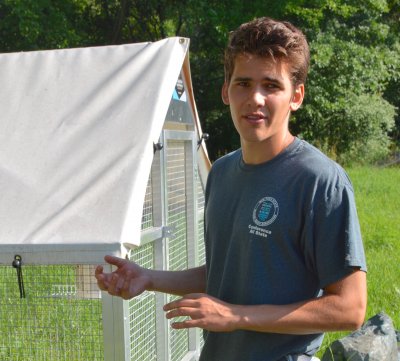Gabe Miller ’20

Gabe Miller, a junior sustainable food systems major from Ithaca, New York, is a student who thrives at the intersection of big ideas and hands on learning. A conversation with Gabe zigzags between food sovereignty, human rights issues and the building of solar ovens.
Gabe chose to major in sustainable food systems because it will enable him to work with interlocking issues related to the environment, justice and human rights.
“We’re failing both the environment and people right now,” he says.
Between his sophomore and junior years, Gabe spent a summer in the Agroecology Summer Intensive at Merry Lea Environmental Learning Center of Goshen College—a requirement for food systems majors. Students take courses in food systems, agroecology, animal husbandry and crop and soil management while living at the Merry Lea Sustainable Farm (MLSF).
Making Sustainable Food Affordable
The problem of making sustainable food both economically viable for the farmer and affordable for all people intrigues Gabe. In the present economic landscape, sustainable farmers often need to choose between working for a non-profit or catering to the well-to-do. Bridging this divide is the sort of challenge he might enjoy working on in the future.
For the moment at least, Gabe has found a practical response: he’s designing and building a solar oven for the MLSF. He chose this project to fulfill a course requirement partly because it is a strategy a small farmer could use to control costs.
“Solar energy is a way to process value-added products on the farm without reliance on non-renewable inputs,” Gabe explains. One example involves the farm’s tomatoes. Heirloom tomatoes lose some of their intense flavor when processed as sauce. Canning also requires a lot of electricity. Drying the tomatoes with a solar dryer–a set of stacked racks inside a greenhouse chamber–avoids both these down sides.
Solar ovens, meanwhile, can reach temperatures of up to 350 degrees using only the power of the sun. A simple model can be cobbled together using a car windshield reflector, a baking bag and a cooling rack. Sophisticated models can even transfer heat into a kitchen.
The oven Gabe is working on involves an insulated box with aluminum reflectors above it to concentrate the heat from the sun. Inside, several layers of glass trap the heat, creating an intense greenhouse effect. The result will be a practical tool that students living at Rieth Village can use to boil water or cook their food. It will also serve as an example of affordable home-scale technology.
Building a solar oven requires science and carpentry skills. Understanding why one might want one requires an understanding of farm economics and social issues. Gabe is enjoying the mix of ideas and action.




